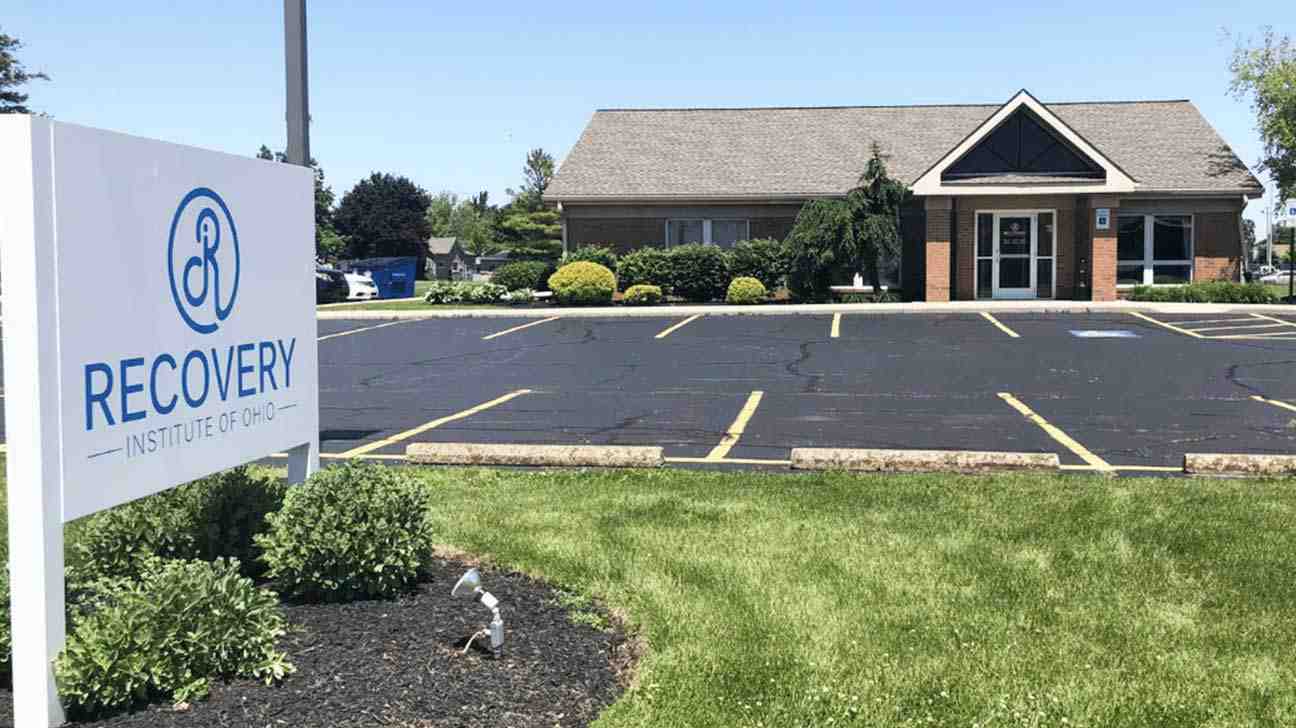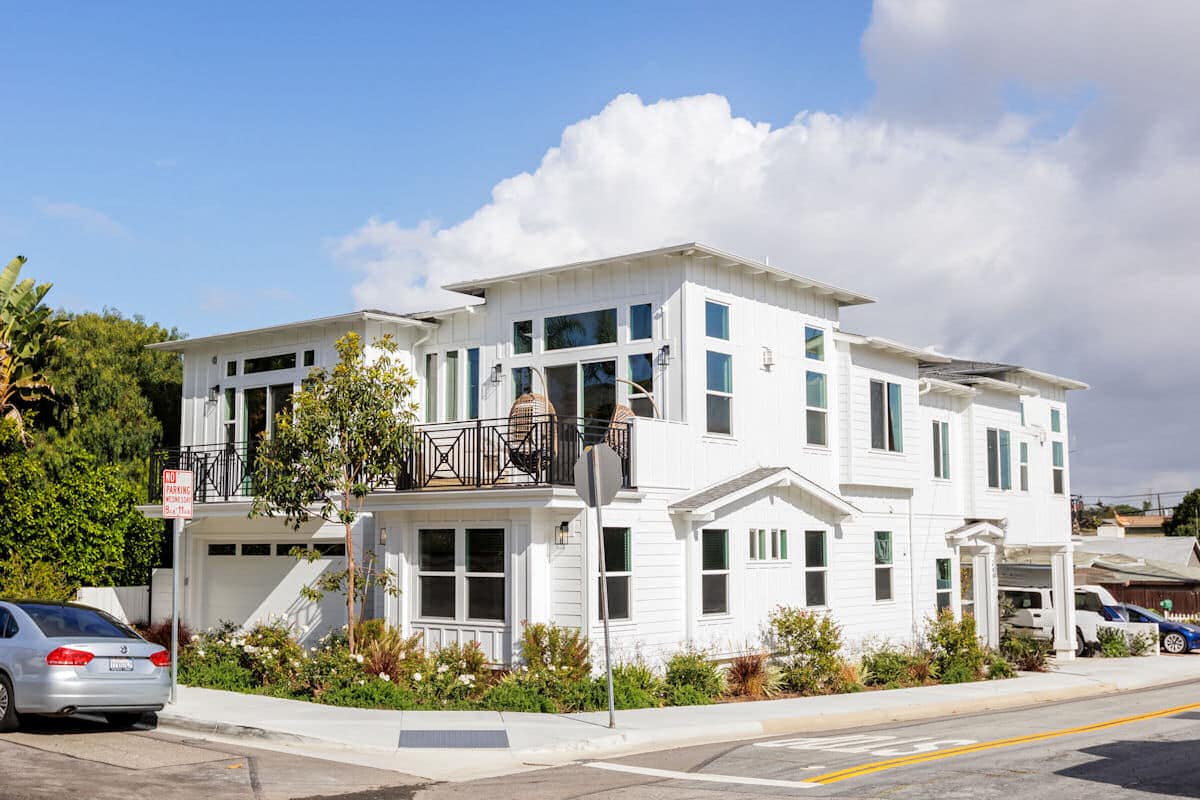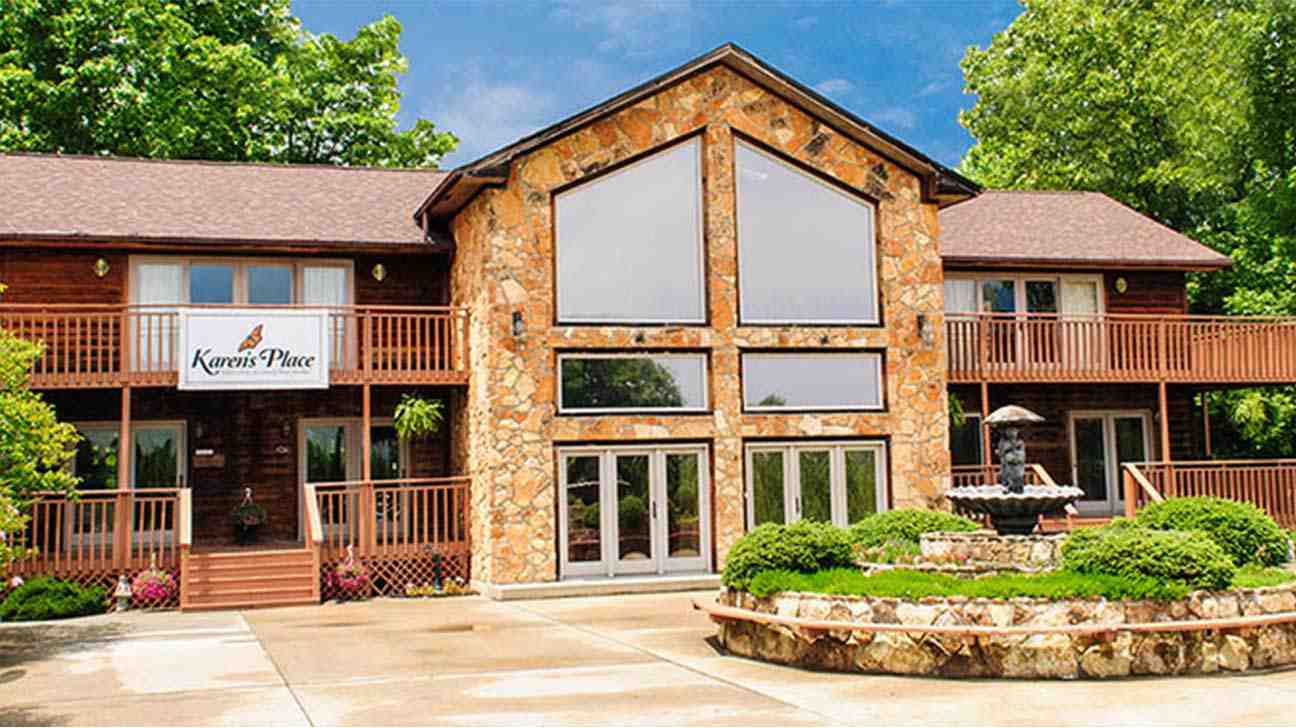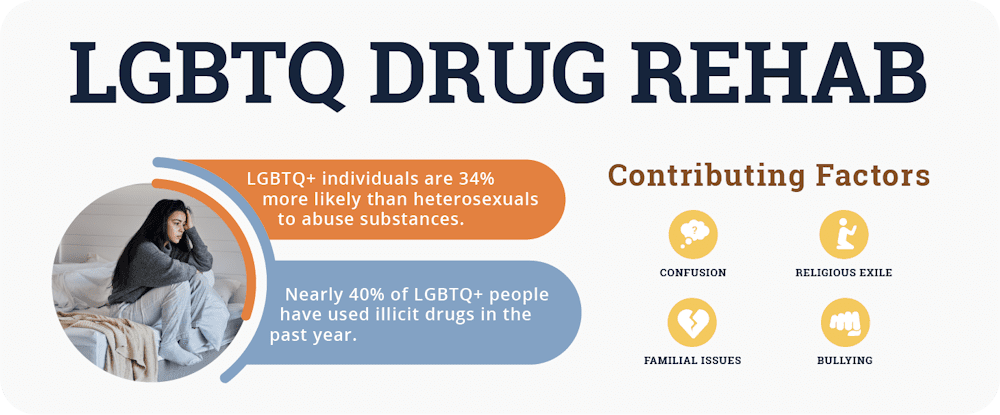
Why LGBTQ+ Individuals Need Specialized Inpatient Care
LGBTQ inpatient rehab provides specialized addiction treatment designed to address the unique challenges faced by lesbian, gay, bisexual, transgender, and queer individuals. Here’s what makes it different:
Key Features of LGBTQ+ Inpatient Rehab:
- Culturally competent staff trained in LGBTQ+ issues and minority stress
- Safe, affirming environment free from discrimination and judgment
- Integrated mental health treatment for co-occurring disorders like depression, anxiety, and PTSD
- Chosen family inclusion in therapy and recovery planning
- Gender-affirming medical care including HRT management for transgender patients
- Peer support from others with shared experiences
- Trauma-informed approaches that address discrimination and rejection
The statistics are stark. According to the Substance Abuse and Mental Health Services Administration (SAMHSA), between 20-30% of LGBTQ+ individuals struggle with substance use disorders, compared to just 9% of the general population. This disparity is driven by discrimination, social stigma, family rejection, and what researchers call “minority stress.”
Unique pressures like harassment, lack of family support, and internalized homophobia contribute to higher rates of addiction. For example, 32% of LGBTQ+ males have a substance use disorder compared to 20.7% of straight males.
The challenge is often compounded by mental health issues. LGBTQ+ individuals are more than twice as likely to face a dual diagnosis of a mental illness and a substance use disorder.
Traditional rehabs often fail to address these specific needs, causing many to avoid treatment due to fear of discrimination. Finding an affirming inpatient rehab can be lifesaving.
At Addiction Helpline America, we’ve helped thousands of LGBTQ+ individuals and families find specialized LGBTQ inpatient rehab programs that provide culturally competent, affirming care. Our team understands the unique barriers you face and can connect you with treatment centers where your identity is respected and your recovery is prioritized.
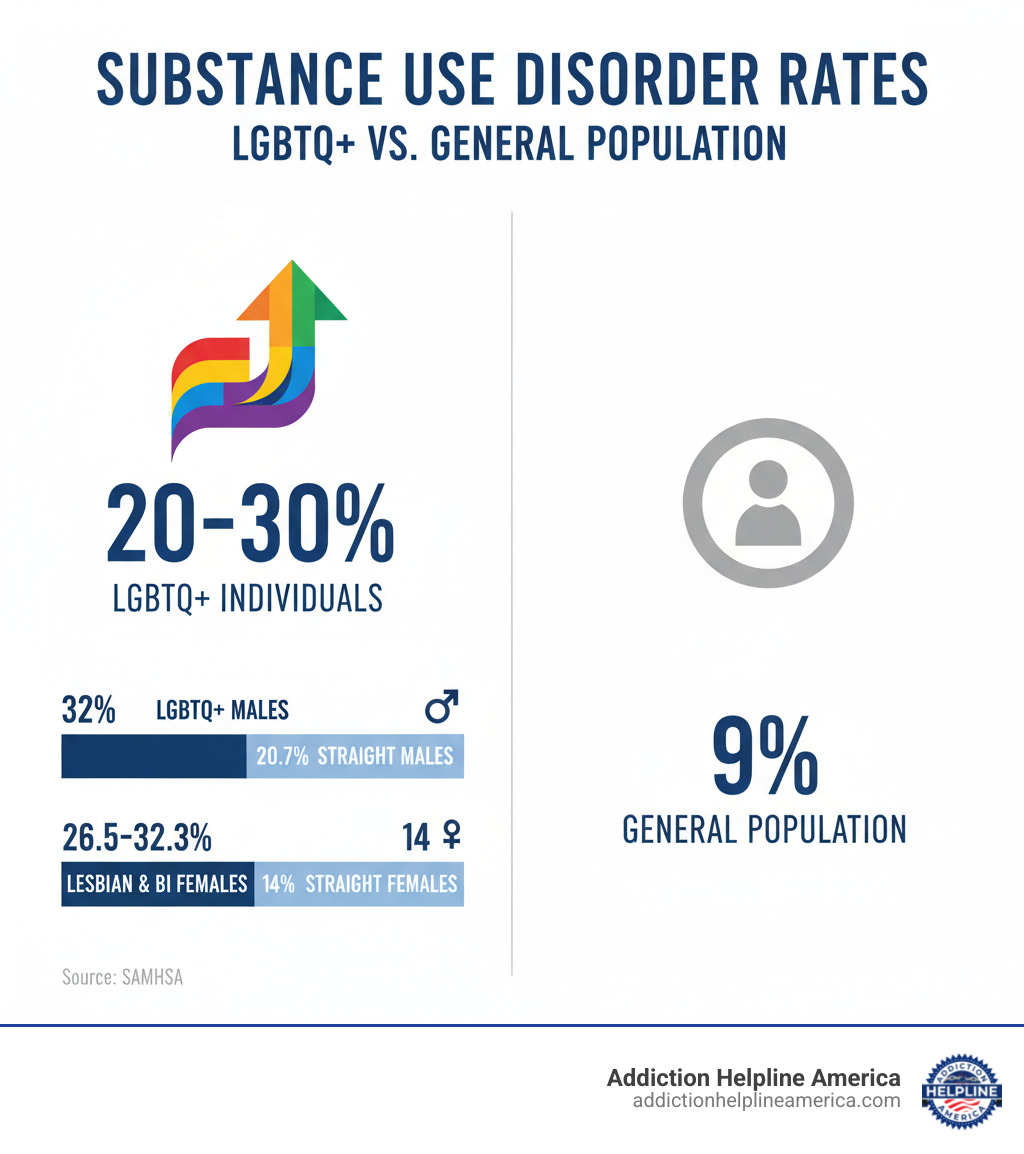
LGBTQ inpatient rehab further reading:
Why Specialized LGBTQ+ Addiction Treatment is Crucial

Addiction is often rooted in underlying pain, and for LGBTQ+ individuals, this pain is frequently linked to their identity and societal treatment. Chronic “minority stress” from judgment, discrimination, and rejection makes this community more vulnerable to anxiety, depression, and substance use as a coping mechanism.
Many have faced discrimination in healthcare, creating barriers to seeking help. An affirming LGBTQ inpatient rehab removes these barriers, providing a safe, understanding environment where individuals can focus on healing. This sense of community and safety is therapeutic and essential for recovery.
According to SAMHSA, 1.9 million Americans who identify as lesbian, gay, or bisexual experience both substance abuse and mental health disorders at the same time. You can’t treat one without addressing the other. Specialized programs understand this and are designed to tackle both simultaneously.
Unique Challenges and Higher Rates of Substance Use
The minority stress model explains how chronic discrimination creates unique stress from harassment, bullying, and lack of acceptance. For many, this trauma starts early with family rejection. Internalized homophobia and transphobia—believing the negative messages from society—also take a toll, and substances can feel like an escape.
These compounding stressors explain why between 20-30% of LGBTQ+ individuals struggle with substance use disorders, compared to just 9% of the general population. Traditional treatment that ignores these challenges often fails. For a deeper understanding of how specialized programs address these issues, check out our guide on LGBTQ+ Addiction Treatment.
The Power of an Affirming and Safe Environment
In an affirming LGBTQ inpatient rehab, the fear of judgment disappears. Judgment-free care is standard, with staff trained in cultural competency who understand the specific challenges LGBTQ+ people face. Using correct pronouns and chosen names is standard practice, validating identity and creating the psychological safety needed for healing.
Peer support is another key element. Group therapy with others who have similar life experiences reduces isolation and builds a strong community, which is crucial since many LGBTQ+ people have learned to avoid healthcare settings due to past negative experiences. This safe environment fosters the trust and openness essential for recovery.
Addressing Co-Occurring Mental Health Disorders
Specialized treatment is critical because most LGBTQ+ individuals in rehab are also dealing with a dual diagnosis—a substance use disorder combined with a mental health condition. LGBTQ+ individuals are more than twice as likely to experience conditions like depression, anxiety, and PTSD, often stemming from discrimination and minority stress.
Eating disorders are also 2-4 times more common in trans and non-binary people. Since addiction and mental health are intertwined, integrated treatment is essential. Specialized LGBTQ inpatient rehab programs are built to treat the whole person, addressing trauma, stigma, and mental health conditions simultaneously. To learn more about how integrated care works, visit our page on Dual Diagnosis Treatment Facility.
What to Look For: 7 Features of the Best LGBTQ+ Inpatient Rehabs

Choosing the right LGBTQ inpatient rehab is about finding a place where you can be your authentic self while healing. The best programs offer evidence-based care, individualized treatment plans, and a holistic approach. Our guide on Evidence-Based Rehab offers more insights.
Below are seven essential features of an exceptional LGBTQ inpatient rehab.
1. Culturally Competent Staff and Programming
Culturally competent staff have specific training on LGBTQ+ issues, minority stress, and the impact of discrimination. They use inclusive language, respect your chosen name and pronouns, and understand your experience without judgment. The programming also reflects this, with LGBTQ-specific group therapy topics like coming out, family rejection, or internalized homophobia. This competency is woven into every aspect of care.
2. Integrated Dual Diagnosis Treatment
Since co-occurring disorders are common in the LGBTQ+ community, integrated dual diagnosis treatment is essential. The best programs have on-site psychiatrists and therapists who understand that conditions like depression, anxiety, or PTSD are connected to substance use. Treatment addresses both simultaneously through medication management, targeted therapy, and holistic therapies like yoga and mindfulness to build emotional regulation skills.
3. Inclusive Family and Community Therapy
Exceptional programs redefine “family” to include your chosen family—the friends and allies who support you. These vital people are invited into therapy sessions. Family therapy is an important part of addiction recovery, and it may have separate tracks for healing relationships with family-of-origin and for strengthening your existing support network. The goal is to build a sober support network that is authentic to your life. For more guidance, see our resources on Helping a Loved One with Addiction.
4. Specialized Medical and Psychiatric Care for an LGBTQ inpatient rehab
For transgender and gender non-conforming individuals, gender-affirming care is critical. Quality programs ensure continuity of Hormone Replacement Therapy (HRT) and have staff knowledgeable about the specific health needs of transgender individuals during detox and recovery. This includes gender-neutral bathrooms and staff who understand LGBTQ+ sexual health, like PrEP management. All medical care is delivered with dignity and respect for your identity.
5. A Focus on Trauma-Informed Care
Many LGBTQ+ individuals carry trauma from bullying, rejection, or violence, which often drives addiction. Trauma-informed care creates a safe space where you won’t be re-traumatized. The best programs use evidence-based trauma therapies like Eye Movement Desensitization and Reprocessing (EMDR) and Cognitive Processing Therapy (CPT) to help you process traumatic memories. You’ll also learn trigger management skills and build resilience, breaking the link between trauma and addiction.
6. Peer Support and Community Building in an LGBTQ inpatient rehab
Peer support in an LGBTQ inpatient rehab provides instant understanding. In group therapy with LGBTQ+ peers, you can discuss how your identity intersects with addiction without fear of judgment. These shared life experiences create powerful bonds and reduce the isolation that can trigger relapse. Many programs offer alumni programs and community-building activities to help you maintain these lasting sober connections after treatment.
7. Comprehensive Aftercare Planning
The best LGBTQ inpatient rehab programs create a comprehensive aftercare plan before you leave. This plan includes relapse prevention strategies custom to you, connections to local LGBTQ+ resources and affirming therapists, and sober living recommendations if needed. It outlines ongoing therapy and support groups and helps you define your long-term recovery goals to build the life you want.
At Addiction Helpline America, we understand that finding a program with all these features can feel like searching for a needle in a haystack. That’s exactly why we’re here—to help you steer the options and find an LGBTQ inpatient rehab that checks every box. Your recovery deserves nothing less than a program that sees you, accepts you, and supports you completely.
Comparing Traditional vs. LGBTQ-Affirming Rehab Programs
Understanding the difference between traditional and LGBTQ inpatient rehab is key to making an informed choice. While both aim for sobriety, their approaches and environments differ significantly. For LGBTQ+ individuals, a specialized program provides the psychological safety that is essential for healing, rather than an environment where you might feel the need to hide parts of yourself.
| Feature | Traditional Rehab Program | LGBTQ-Affirming Rehab Program |
|---|---|---|
| Staff Training | General addiction/mental health training | Specialized training in LGBTQ+ cultural competency, minority stress, gender-affirming care |
| Group Therapy Topics | General addiction issues, coping skills, relapse prevention | Includes LGBTQ-specific topics: identity, coming out, internalized homophobia, chosen family, navigating discrimination |
| Family Therapy Definition | Typically focuses on biological/legal family | Includes chosen family; addresses family-of-origin issues related to identity |
| Safety & Environment | Assumes heteronormativity; may lack explicit LGBTQ+ inclusivity | Explicitly safe, judgment-free space; gender-neutral facilities; affirms pronouns/names |
| Medical Care | General medical care; may not be equipped for gender-affirming needs | Includes gender-affirming care (e.g., HRT management); knowledgeable about LGBTQ+ sexual health |
| Peer Support | General peer group | Peer groups focused on shared LGBTQ+ experiences, fostering deep connection |
| Trauma Approach | General trauma-informed care | Specific focus on minority stress and identity-related trauma |
| Focus | Universal addiction recovery | Recovery within the context of LGBTQ+ identity and experiences |
Differences in Therapeutic Approach
The therapeutic approach in an LGBTQ inpatient rehab is more specific. While traditional rehabs cover general coping skills, affirming programs also tackle issues central to the LGBTQ+ experience, like internalized homophobia, coming out, and discrimination. They address the strong link between body image issues and drug addiction, which is especially prevalent in the community. The approach to trauma is also more focused, addressing identity-related trauma and minority stress with specific therapeutic tools.
Environment and Staff Philosophy
The biggest difference is the environment. Traditional rehabs can have an unspoken assumption of heteronormativity, making LGBTQ+ clients feel invisible or misunderstood. This requires exhausting emotional labor that detracts from recovery. An LGBTQ inpatient rehab intentionally creates a space of affirmation. With gender-neutral facilities, correct pronoun usage as standard policy, and staff trained in cultural competency, they build psychological safety. This feeling of being respected and understood is what makes deep, lasting healing possible.
At Addiction Helpline America, we’ve seen how powerful this difference can be. We’ve helped connect thousands of LGBTQ+ individuals with affirming treatment programs where they could finally let their guard down and focus entirely on recovery. That sense of belonging and safety isn’t a luxury—it’s a foundation for lasting change.
Frequently Asked Questions about LGBTQ Inpatient Rehab

We know that searching for the right LGBTQ inpatient rehab can feel overwhelming. You’re not just looking for addiction treatment—you’re looking for a place where you can truly be yourself while healing. Let’s walk through some of the questions we hear most often.
How do I know if a rehab center is truly LGBTQ+-friendly?
Look beyond website claims. Ask pointed questions about staff training on LGBTQ+ issues. Verify their pronoun and name policies and check for gender-neutral facilities. Inquire how they handle LGBTQ-specific topics in group therapy and if they include chosen family. Truly affirming centers will have explicit inclusivity statements and be transparent. For more tips, visit our page on how to Find a Rehab.
What if my family isn’t supportive of my identity?
This is a common challenge that specialized LGBTQ inpatient rehab programs are equipped to handle. They recognize and include your chosen family in therapy. Individual counseling helps you steer emotions around unsupportive relatives and learn healthy boundary setting. The focus is on building a strong external support system of peers and community resources, proving that recovery is possible even without the support of your family of origin.
Does insurance cover specialized LGBTQ+ inpatient rehab?
Yes, insurance generally covers LGBTQ inpatient rehab. The Affordable Care Act (ACA) and the Mental Health Parity and Addiction Equity Act (MHPAEA) mandate coverage for mental health and substance use treatment. However, details like deductibles and copays vary by plan. The best step is to verify your benefits before choosing a program; most rehabs offer free help with this. If you lack insurance, options like Free Rehabs and sliding scale fees are available.
At Addiction Helpline America, we’ve helped thousands of people steer insurance questions and find LGBTQ inpatient rehab programs that fit both their clinical needs and their budget. You don’t have to figure this out alone.
Taking the Next Step Toward Recovery
Choosing to enter LGBTQ inpatient rehab is a brave commitment to your future. The rewards are life-changing: improved mental health, sustainable sobriety, stronger self-esteem from being in an affirming environment, and a supportive community that understands your experiences. These are the outcomes we see in people who find the right treatment. Recovery is possible, and it’s happening right now for LGBTQ+ individuals across the country who’ve taken this step.
You don’t have to figure this out alone. At Addiction Helpline America, we provide free, confidential guidance to help you find the right LGBTQ inpatient rehab for your specific needs. We’ve built relationships with specialized treatment centers nationwide, and we understand what makes truly affirming care different from facilities that simply claim to be “friendly.”
Our team takes the time to understand your situation—your substance use history, your mental health needs, your insurance coverage, and what you’re looking for in a treatment environment. Then we match you with programs from our vast network that align with your needs and honor your identity. We handle the details, verify your benefits, and walk you through the admissions process so you can focus on preparing for this important step.
Whether you’re seeking help for yourself or supporting a loved one through this decision, we’re here. Explore different types of treatment programs to understand your options, or reach out to us directly for personalized matching. Your journey to lasting recovery can begin today—and you deserve a treatment experience where you’re celebrated, supported, and truly seen.
Our helpline is 100%
free & confidential
If you or someone you care about is struggling with drug or alcohol addiction, we can help you explore your recovery options. Don’t face this challenge alone—seek support from us.
Programs
Resources
Will my insurance
cover addiction
treatment?
We're ready to help
Find the best
drug or alcohol treatment
center
Are you or a loved one struggling with addiction? Call today to speak to a treatment expert.

